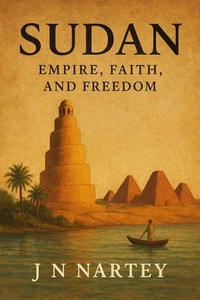For centuries, the institution of chieftaincy has stood at the center of African society-an enduring symbol of authority, culture, and identity. Long before the arrival of colonial powers, chiefs were custodians of land, guardians of tradition, and mediators between the living and the ancestors. They embodied both political leadership and spiritual responsibility, anchoring communities through law, ritual, and kinship.
In Chieftaincy in Africa: Tradition, Power, and Identity, J. N. Nartey explores the rich tapestry of African chieftaincy systems across time and region. From the divine kingship of the Ashanti and the Yoruba Obas, to the resilience of the Buganda kingdom and the authority of the Zulu monarchy, this book uncovers the ways chiefs have shaped-and been shaped by-history, colonialism, and the modern nation-state.
Balancing scholarship with storytelling, the book traces how chiefs adapted under colonial rule, navigated post-independence politics, and continue to play vital roles in conflict resolution, governance, and cultural preservation today. It also examines the evolving place of women in chieftaincy, the perspectives of African youth, and the challenges of sustaining tradition in an age of globalization.
Both deeply historical and urgently contemporary, Chieftaincy in Africa reveals the resilience of traditional authority and its relevance in defining Africa's past, present, and future.
For centuries, the institution of chieftaincy has stood at the center of African society-an enduring symbol of authority, culture, and identity. Long before the arrival of colonial powers, chiefs were custodians of land, guardians of tradition, and mediators between the living and the ancestors. They embodied both political leadership and spiritual responsibility, anchoring communities through law, ritual, and kinship.
In Chieftaincy in Africa: Tradition, Power, and Identity, J. N. Nartey explores the rich tapestry of African chieftaincy systems across time and region. From the divine kingship of the Ashanti and the Yoruba Obas, to the resilience of the Buganda kingdom and the authority of the Zulu monarchy, this book uncovers the ways chiefs have shaped-and been shaped by-history, colonialism, and the modern nation-state.
Balancing scholarship with storytelling, the book traces how chiefs adapted under colonial rule, navigated post-independence politics, and continue to play vital roles in conflict resolution, governance, and cultural preservation today. It also examines the evolving place of women in chieftaincy, the perspectives of African youth, and the challenges of sustaining tradition in an age of globalization.
Both deeply historical and urgently contemporary, Chieftaincy in Africa reveals the resilience of traditional authority and its relevance in defining Africa's past, present, and future.

 , qui est-ce ?
, qui est-ce ?